Sudan is to normalise relations with Israel - the latest in a series of Arab League countries to do so.
At the same time, US President Donald Trump has removed Sudan from the US list of state sponsors of terrorism, unblocking economic aid and investment.
Announcing the normalisation, Mr Trump said "at least five more" Arab states wanted a peace deal with Israel, reports the BBC.
The Sudan deal comes weeks after similar moves by the United Arab Emirates (UAE) and Bahrain.
The two Gulf states became the first in the Middle East to recognise Israel in 26 years. The UAE's foreign ministry said it welcomed Sudan's decision, calling it "an important step to boost security and prosperity in the region."
Sudan and Israel said in a three-way statement with the US that delegations would meet "in the coming weeks".
"The leaders agreed to the normalisation of relations between Sudan and Israel and to end the state of belligerence between their nations," it said.
Until last month only two Arab nations - Egypt and Jordan - had officially recognised Israel. The two countries, which border Israel, signed peace agreements in 1979 and 1994 respectively, following US mediation.
Mauritania, an African Arab League member, recognised Israel in 1999 but severed ties 10 years later.
The growing number of Arab countries formalising relations with Israel has been condemned by the Palestinians, who see it as a betrayal of their cause.
Historically, Arab countries conditioned peace talks with Israel on its withdrawal from territories occupied in the 1967 war and the establishment of a Palestinian state with East Jerusalem as its capital.
Palestinian Authority President Mahmoud Abbas said that he rejected the new agreement, saying no-one had the right to speak on behalf of Palestinians. Hamas, which controls Gaza, said it was a "political sin".
How was the move announced?
Shortly after Mr Trump formally moved to remove Sudan from the US list of state sponsors of terrorism, reporters in Washington were taken to the Oval Office where the president was on the phone to the Sudanese and Israeli leaders.
Israeli Prime Minister Benjamin Netanyahu said the agreement was a "dramatic breakthrough for peace" and the start of a "new era".
Sudanese Prime Minister Abdalla Hamdok thanked Mr Trump for removing his country from the US terrorism list and said the Sudanese government was working "towards international relations that best serve our people". Sudanese state TV said the "state of aggression" would end.
While on the phone to the two world leaders, Mr Trump said: "Do you think 'Sleepy Joe' could have made this deal? Somehow I don't think so."
"Sleepy Joe" is his pejorative nickname for his opponent in the upcoming US presidential election, Democrat Joe Biden.
In response, Mr Netanyahu said: "Well, Mr President, one thing I can tell you is, um, uh, we appreciate the help for peace from anyone in America."
The move is seen as a foreign policy victory for Mr Trump ahead of the 3 November election. BBC correspondents say the timing of the announcement is no coincidence.
Mr Trump's pro-Israel policies are seen by his advisers as appealing to Christian evangelical voters, a key part of his voter base.
The US president also said "at least five more" Arab states, including Saudi Arabia, are considering normalising relations with Israel.
His aide, Judd Deere, said the Sudan deal was "another major step toward building peace in the Middle East with another nation joining the Abraham Accords", the term used for the deals signed with the UAE and Bahrain.
Meanwhile, Israel said it would not oppose US sales of high-grade military hardware to the UAE. The US had agreed to consider allowing the UAE to buy F-35 fighter jets after normalising ties with Israel.
Israel had said it needed to maintain a military advantage over other states in the Middle East. However, earlier this week it said the US had agreed to upgrade Israeli military capabilities.


